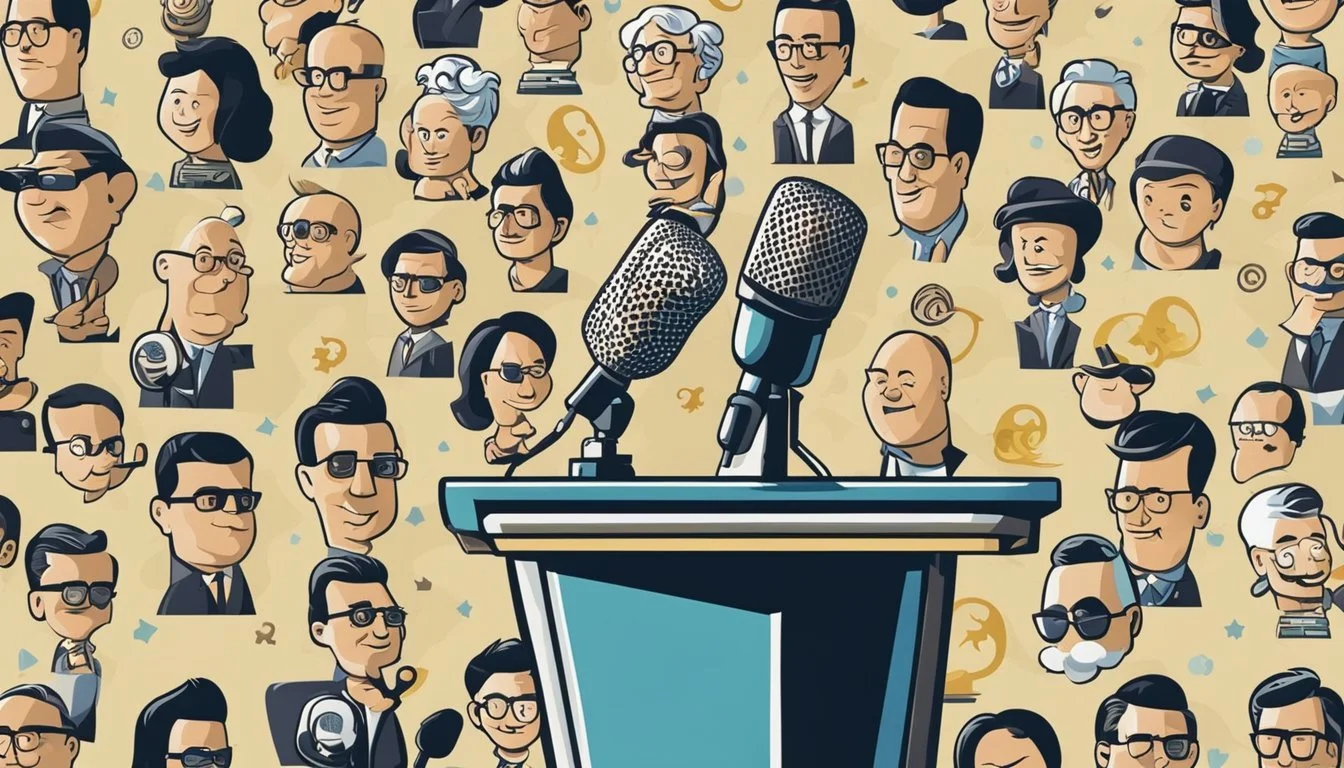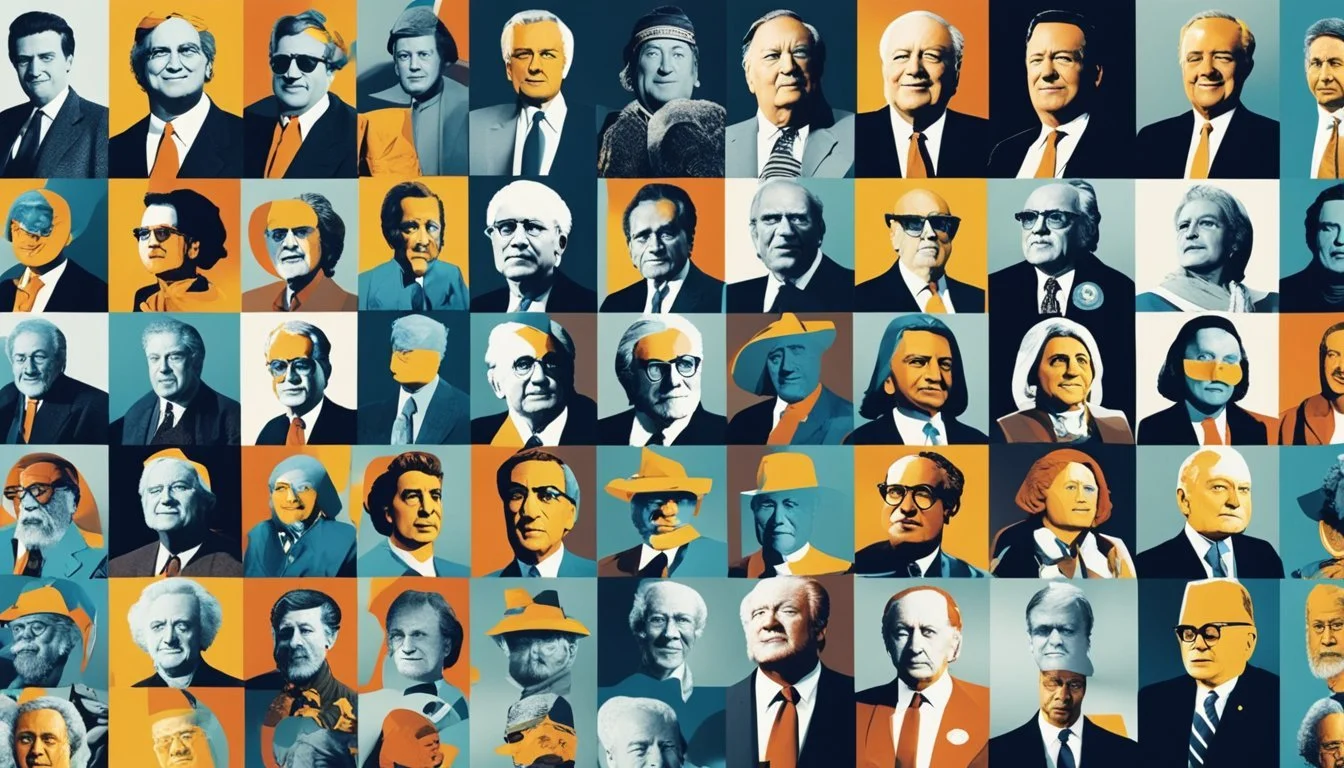8 Documentaries About Political Satire That Will Make You Think
Political satire has long been a powerful tool for commentary and criticism, blending humor with incisive social and political observations. Through various forms of media, it exposes the absurdities and contradictions inherent in political systems and figures, allowing audiences to engage with complex issues in an accessible and often entertaining way.
Documentaries about political satire provide a unique lens through which viewers can explore the intersection of humor and politics. These films not only entertain but also illuminate the underlying truths about governance, policy, and power dynamics. By delving into the world of satirical content, these documentaries offer insight into how satire shapes public perception and influences political discourse.
1) The Great Dictator (1940)
Charlie Chaplin's "The Great Dictator" is a landmark film in political satire.
Chaplin wrote, directed, produced, and starred in this 1940 film, using humor to criticize Adolf Hitler and the rise of fascism in Europe.
The film features Chaplin in dual roles: as a Jewish barber and as Adenoid Hynkel, the dictator of Tomainia, a parody of Hitler.
One of the standout scenes is the dictator's dance with a globe, symbolizing his delusional ambitions.
The movie was daring for its time, directly mocking Nazi ideology before the United States entered World War II.
Chaplin's work remains a powerful commentary on dictatorship and intolerance.
2) Dr. Strangelove (1964)
"Dr. Strangelove or: How I Learned to Stop Worrying and Love the Bomb," commonly known as "Dr. Strangelove," is a political satire black comedy. Directed by Stanley Kubrick, it remains a significant work highlighting the absurdity of nuclear warfare.
Peter Sellers stars in three distinct roles, showcasing his versatile talent. The film satirizes the Cold War tensions between the United States and the Soviet Union.
The screenplay, co-written by Kubrick, Terry Southern, and Peter George, blends dark humor with serious themes. Memorable scenes, such as the one where a soldier is ordered to shoot a Coca-Cola machine for quarters to call the President, illustrate the film's unique approach to political commentary.
Released by Columbia Pictures, "Dr. Strangelove" is often regarded as one of the greatest political satires ever made. Its clever dissection of the power dynamics and the absurdities of international relations during the Cold War remains relevant.
For more information on "Dr. Strangelove," visit the film's Wikipedia page.
3) In the Loop (2009)
"In the Loop" is a British political satire directed by Armando Iannucci. It features a stellar cast including Peter Capaldi, Harry Hadden-Paton, and Gina McKee.
The film explores the chaotic and absurd machinations of American and British operatives trying to prevent a war between two countries.
Known for its biting wit, "In the Loop" is acclaimed for blending elements of political satire with a sharp comedic edge. The screenplay and performances are often compared to classics like "Dr. Strangelove."
This film is particularly noted for its incisive critique of political bureaucracy and media spin. Audiences praised its ability to invoke laughter while also offering a potent commentary on contemporary politics.
"In the Loop" garnered positive reviews for its script and performances. It has been described as both funny and insightful, reflecting the complexities of 21st-century international relations.
For more information, visit IMDb.
4) Jojo Rabbit (2019)
Taika Waititi’s "Jojo Rabbit" is a unique blend of dark humor and historical drama. The film portrays the experiences of Jojo, a young boy in Nazi Germany, who discovers that his mother is hiding a Jewish girl in their home.
"Jojo Rabbit" stands out for its bold approach to satire, using humor to address the serious subject of Nazi ideology and the absurdities of fanaticism. The film’s use of an imaginary version of Adolf Hitler, played by Waititi himself, provides a stark contrast to the grim reality of World War II.
The film received critical acclaim for its performances and its ability to balance comedy with poignant moments. It provokes reflection on the devastating consequences of hate and the importance of compassion.
5) Borat: Cultural Learnings of America for Make Benefit Glorious Nation of Kazakhstan (2006)
"Borat: Cultural Learnings of America for Make Benefit Glorious Nation of Kazakhstan" is a mockumentary that uses political satire to highlight various aspects of American culture through the eyes of Borat Sagdiyev.
Borat, portrayed by Sacha Baron Cohen, is a fictional journalist from Kazakhstan who embarks on a journey across the United States. The film is a blend of unscripted interactions and scripted scenes, creating a comedic yet poignant critique of social and political issues.
The film's humor often stems from Borat's exaggerated misunderstanding of American customs and his interactions with unsuspecting individuals. His offensive remarks and crude behavior force people to reveal their prejudices and biases, making the audience reflect on societal norms and bigotry.
The character of Borat first appeared on the television show "Da Ali G Show," and the success of that character led to the creation of the full-length film. It stands out in the genre of political satire due to its bold approach and unfiltered social commentary.
For more information, check IMDB or Wikipedia.
6) Team America: World Police (2004)
"Team America: World Police" is a satirical comedy film released in 2004. Directed by Trey Parker and co-written by Parker, Matt Stone, and Pam Brady, this movie is known for its use of puppetry and its bold, no-holds-barred commentary on American foreign policy.
A parody of big-budget action movies, "Team America: World Police" dives into themes of American interventionism and militarism. The film's plot centers around an elite counter-terrorism organization that fights to keep the world safe, often causing more harm than good in the process.
Trey Parker and Matt Stone, also creators of "South Park," bring their irreverent style of humor to the forefront. The film employs marionettes in a deliberate nod to the 1960s "Thunderbirds" series. This unique choice heightens the absurdity of the narrative and underscores the exaggerated patriotism and political blunders it critiques.
Starring voices like Kristen Miller, Masasa Moyo, and Daran Norris, the film remains a controversial piece for its unapologetic satire of post-9/11 American politics. It targets not only America's role on the global stage but also the media and Hollywood celebrities.
For more information, you can visit the Wikipedia page on Team America: World Police.
7) Wag the Dog (1997)
"Wag the Dog," directed by Barry Levinson, starring Dustin Hoffman and Robert De Niro, presents a fictional scenario involving a fabricated war to distract from a presidential scandal. The film explores themes of media manipulation and political spin.
This political satire highlights the lengths to which politicians might go to cover up their indiscretions. It questions the integrity of those in power and the media's role in shaping public perception.
Set against the backdrop of a re-election campaign, the film remains thought-provoking and relevant. Its narrative suggests a cynical view of politics, where truth is often secondary to image management.
For more information, visit Wag the Dog on IMDb.
8) The Death of Stalin (2017)
"The Death of Stalin," directed by Armando Iannucci, is a political satire that takes place during the chaotic aftermath of Soviet leader Joseph Stalin's death in 1953.
The film is a dark comedy that portrays the power struggle among the members of the Soviet Politburo.
Adapted from a French graphic novel, the movie mixes real events with absurdist humor.
The cast includes Steve Buscemi, Simon Russell Beale, and Jeffrey Tambor, who bring their comedic talents to the grim historical setting.
Iannucci's sharp wit and satirical lens expose the ridiculous lengths to which Stalin's inner circle went to secure power.
"The Death of Stalin" received praise for its script, direction, and performances, making it a notable entry in the political satire genre.
More information on The Death of Stalin
The Evolution of Political Satire
Political satire has developed from ancient forms of humor to become a modern tool for critiquing power dynamics and influencing public discourse.
Historical Context
Political satire traces its roots back to ancient Greece, where playwrights like Aristophanes used comedic plays to critique political leaders. In medieval Europe, court jesters employed satire to mock royalty without retribution. By the 18th century, satirical pamphlets and cartoons were widely used to lampoon political figures and events. Jonathan Swift's "Gulliver's Travels" and Voltaire's "Candide" are notable examples from this period. The advent of the printing press and later, broadcast media, further amplified the reach of satirical content, bringing it into the homes of everyday people.
Key Figures and Movements
Several key figures have shaped the evolution of political satire. In the 20th century, George Orwell and Joseph Heller utilized literary satire to criticize totalitarian regimes and war, respectively. Television shows like "Saturday Night Live" and "The Daily Show" revolutionized political satire by incorporating it into mainstream media. Figures such as Lenny Bruce and Richard Pryor brought biting social commentary to the forefront of stand-up comedy. In contemporary times, digital platforms have given rise to satirical news outlets like The Onion and Charlie Hebdo, further diversifying the landscape of political satire.
Impact on Society
The impact of political satire on society is profound. It serves as a mirror to the political landscape, often exposing hypocrisy and corruption. Satirical works can influence public opinion by making political issues more accessible and engaging. For instance, shows like "Last Week Tonight with John Oliver" have sparked public debates and influenced policy discussions. Political satire also plays a role in shaping the political literacy of its audience, making complex issues more understandable. Through humor and irony, it encourages critical thinking and promotes civic engagement.
Analyzing Documentary Techniques
Documentaries about political satire employ various techniques to engage the audience. They often mix narrative styles, humor, irony, and distinct interview formats to present their subjects effectively.
Narrative Styles
Narrative styles used in political satire documentaries vary widely. Some filmmakers opt for a linear narrative, presenting events in chronological order to allow a straightforward understanding. Others use a non-linear approach, where the story may jump back and forth in time, adding depth and engagement.
Documentaries might also use hybrid narratives, combining elements of fiction and non-fiction. This can include reenactments alongside real footage, blurring the line between reality and satire.
Use of Humor and Irony
Humor and irony are pivotal in political satire documentaries. Filmmakers often employ dry humor and sarcasm to critique political situations. These elements help to soften the delivery of critical content, making it more palatable to the audience.
Visual humor is also prevalent, using juxtaposition of absurd images with serious commentary to highlight the ridiculousness of political scenarios. Irony is a powerful tool here; it exposes contradictions and hypocrisies in politics through incongruous scenes and dialogue.
Interview and Presentation Formats
Interview formats in these documentaries can range from traditional sit-down interviews to man-on-the-street segments. Some prefer mock interviews, where the interviewer poses as a clueless or exaggerated character to draw out revealing responses.
Presentation formats are varied. Some use narration to guide viewers through the content, while others may lean on visual storytelling, allowing images and footage to speak for themselves. An engaging format is the film essay, where the filmmaker’s voice and perspective lead the narrative, often blending personal observations with broader political commentary.






